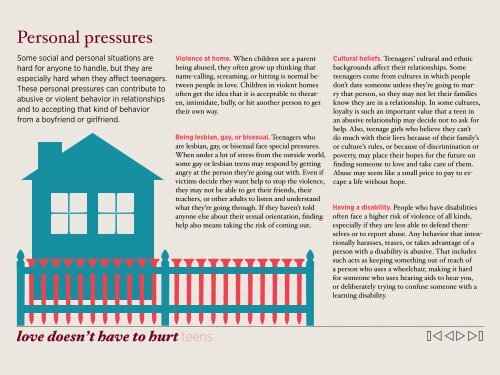1zllv0N
1zllv0N
1zllv0N
You also want an ePaper? Increase the reach of your titles
YUMPU automatically turns print PDFs into web optimized ePapers that Google loves.
Personal pressuresSome social and personal situations arehard for anyone to handle, but they areespecially hard when they affect teenagers.These personal pressures can contribute toabusive or violent behavior in relationshipsand to accepting that kind of behaviorfrom a boyfriend or girlfriend.Violence at home. When children see a parentbeing abused, they often grow up thinking thatname-calling, screaming, or hitting is normal betweenpeople in love. Children in violent homesoften get the idea that it is acceptable to threaten,intimidate, bully, or hit another person to gettheir own way.Being lesbian, gay, or bisexual. Teenagers whoare lesbian, gay, or bisexual face special pressures.When under a lot of stress from the outside world,some gay or lesbian teens may respond by gettingangry at the person they’re going out with. Even ifvictims decide they want help to stop the violence,they may not be able to get their friends, theirteachers, or other adults to listen and understandwhat they’re going through. If they haven’t toldanyone else about their sexual orientation, findinghelp also means taking the risk of coming out.Cultural beliefs. Teenagers’ cultural and ethnicbackgrounds affect their relationships. Someteenagers come from cultures in which peopledon’t date someone unless they’re going to marrythat person, so they may not let their familiesknow they are in a relationship. In some cultures,loyalty is such an important value that a teen inan abusive relationship may decide not to ask forhelp. Also, teenage girls who believe they can’tdo much with their lives because of their family’sor culture’s rules, or because of discrimination orpoverty, may place their hopes for the future onfinding someone to love and take care of them.Abuse may seem like a small price to pay to escapea life without hope.Having a disability. People who have disabilitiesoften face a higher risk of violence of all kinds,especially if they are less able to defend themselvesor to report abuse. Any behavior that intentionallyharasses, teases, or takes advantage of aperson with a disability is abusive. That includessuch acts as keeping something out of reach ofa person who uses a wheelchair, making it hardfor someone who uses hearing aids to hear you,or deliberately trying to confuse someone with alearning disability.love doesn’t have to hurt teens


